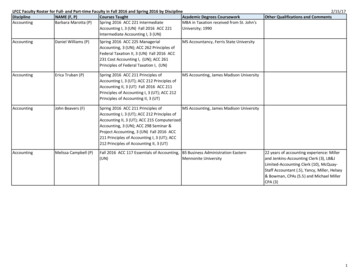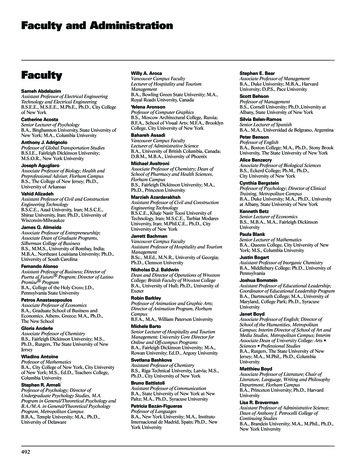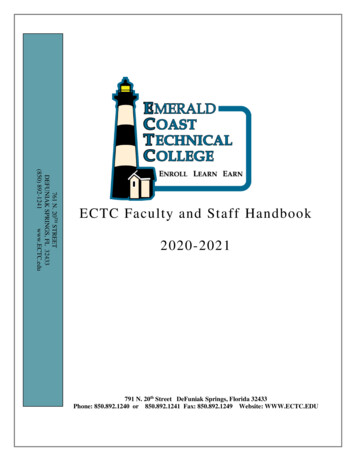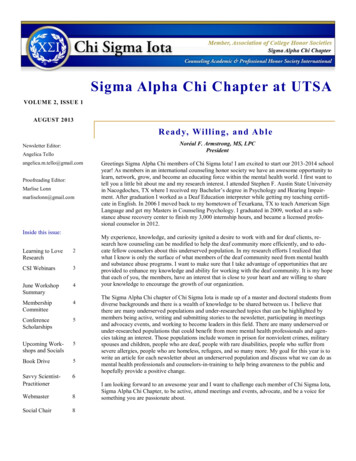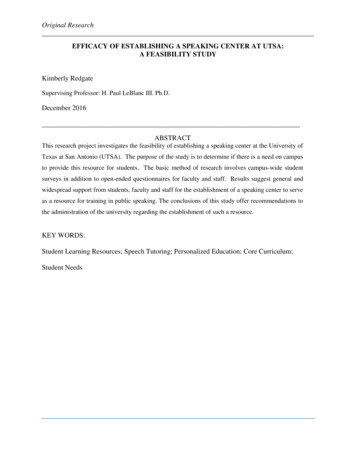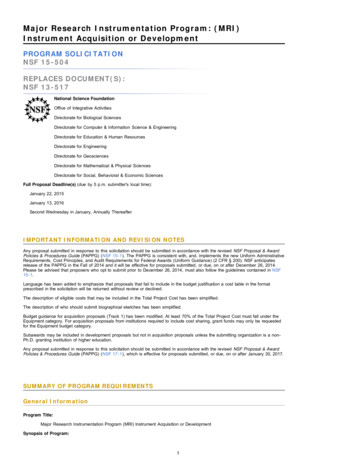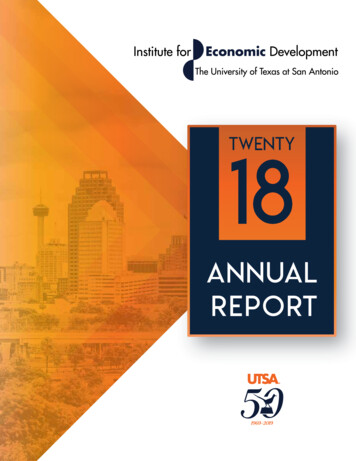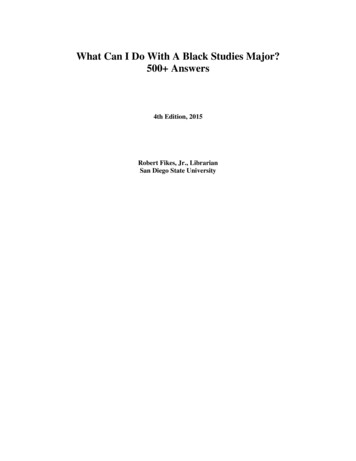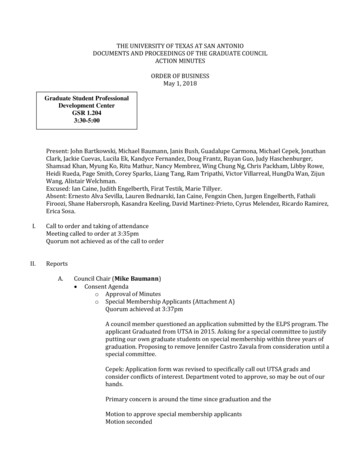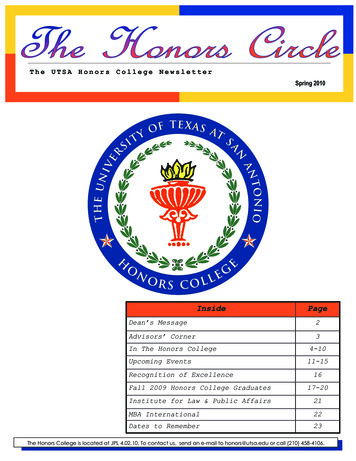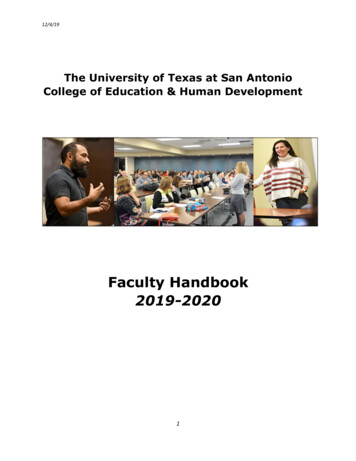
Transcription
12/4/19The University of Texas at San AntonioCollege of Education & Human DevelopmentFaculty Handbook2019-20201
12/4/19Table of ContentsSection 1: General Information1.1 The University of Texas at San Antonio1.2 The College of Education & Human Development1.3 Associate Deans’ Roles & ResponsibilitiesSection 2: Working at UTSA2.1 Identification of Employment2.2 Parking Information2.3 Employment Standards and ComplianceSexual HarassmentScholastic DishonestyCompliance Training2.4 Faculty Roles and Responsibilities2.5 Faculty Governance2.6 Payroll and Benefits2.7 Travel Information2.8 Special BenefitsRegaliaFaculty DiscountsRecreation CenterSection 3: Employment Progress and Reviews3.1 Evaluation of Performance and Promotion2
12/4/193.2 Third Year Review3.3 Review for Tenure & PromotionSection 4: Teaching and Students4.1 Overview of UTSA Enrollment4.2 Scheduling Courses4.3 Preparing to TeachSemester CalendarProcedures to Add a Closed ClassAdding Students to a Closed ClassTeaching on a Different CampusCourse FormatsAccessing Your Class RosterCreating a SyllabusEvaluation Methods Employed in the CourseAdministrative DropMedical or Mental Health DropCourse IncompleteAttendance and Class ParticipationMake-Up WorkStudent Judicial AffairsScholastic Dishonesty, Particularly PlagiarismCriminal Background ChecksStudents with DisabilitiesSpecial RequirementsOffice Hours3
12/4/194.4 Textbooks and Course Materials4.5 Emergency Issues4.6 Support for Teaching4.7 Graduate Student Advising and Supervision4.8 Undergraduate Student Advising4.9 Professional Standards of Performance and Referrals4.10 Independent Study, Thesis, and Dissertation Supervision4.11 Student SupportSection 5: Service5.1 Areas of Service5.2 University Service5.3 COEHD Service5.4 Department Service5.5 Professional and Community ServiceSection 6: Research6.1 Internal Review Board (IRB) process6.2 Support for Research6.3 Research Tips6.4 GrantsSection 7: Technology7.1 Technology Services and Supports7.2 University Graphics and Templates4
12/4/197.3 Special Requests for Hardware or SoftwareAPPENDICES.APPENDIX A. COEHD PROFESSIONAL STAFF, DEPARTMENT, & COLLEGE CONTACT INFORMATIONAPPENDIX B. HELPFUL LINKS TO INFORMATION AND FORMSAPPENDIX C. UTSA ACADEMIC AFFAIRS ORGANIZATIONAL CHARTAPPENDIX D. COEHD ORGANIZATIONAL CHARTAPPENDIX E. FLOWCHART OF ACADEMIC & GRADE GRIEVANCE PROCEDURESAPPENDIX F. COEHD UNDERGRADUATE STUDENT CLUBS AND ORGANIZATIONS APPENDIX G.COEHD GRADUATE STUDENT CLUBS AND ORGANIZATIONS APPENDIX H. COEHD COURSEPREFIXES AND DEPARTMENTAPPENDIX I. LIST OF UTSA COLLEGES & DEPARTMENTSGlossary of COEHD, University, and Statewide Acronyms and Terms5
12/4/19General InformationSection 11.1 The University of Texas at San AntonioEstablished in 1969, the University of Texas at San Antonio (UTSA) is still a relatively young university. With acurrent enrollment of approximately 32,594 students, we are the third largest institution in the University of TexasSystem. The UTSA serves the San Antonio metropolitan area and the broader region of South Texas while alsoattracting students from across the United States and around the globe. Programs and services are offered from itsfour campuses: Main Campus, Downtown Campus, Hemisfair Campus (Institute of Texan Cultures), and Park WestCampus.1.2 The College of Education & Human DevelopmentFaculty, staff, and administrators in the College of Education and Human Development (COEHD) are committed topreparing educators who are knowledgeable about and respectful of the communities they serve and who respondintelligently, creatively, and effectively to the needs of the children and families with whom they work. We are alsocommitted to engaging in research that addresses critical educational issues and that informs policy and practicerelated to these issues. We believe that partnerships with local and area school districts, community agencies,other postsecondary educational institutions, and community-based organizations are crucial to accomplishing ourmission. We are also engaged in a bold endeavor to provide students from San Antonio, the surrounding area, andbeyond with a first-rate education that equips them with the skills to respond to today’s educational challenges aswell as the imagination and flexibility to solve the challenges of the future.College Mission & VisionOur MissionThe College of Education and Human Development (COEHD) will be an international model for developing inclusive,transformative leaders guided by principles of community, integrity, equity, excellence, diversity, scholarship, andservice. The COEHD will have a critical impact on the realization of human and community potential through itsleadership in education, health and wellness, human development, and policy studies. All programs of study include afocus on developing competencies for working effectively in multicultural and cross-national contexts. Our VisionPromotes equity, excellence, social justice, risk-taking, and accountabilityRecognizes a healthy balance among scholarship, teaching, and serviceIs responsive to community needsDevelops and applies new knowledge of effective policies and best practicesPrepares transformational educators/leaders to succeed in diverse, ambiguous, and challenging contextsBuilds community within and at largeFosters the holistic development of all its members6
12/4/19 Uses resources effectively and efficiently so that the College graduates citizens who are engaged in productivecontributions to self, society, and the global communityOur Core ValuesCommitment to social ctCommunityCOEHD ProgramsThe COEHD is one of eight colleges (Architecture, Construction and Planning, Business, Engineering, Honors, Liberaland Fine Arts, Public Policy, Sciences) at UTSA. (See Appendix C: UTSA Academic Affairs Organizational Chart.) TheCOEHD is the leading provider of educators in the San Antonio area and one of the largest in the State of Texas. Thecollege is ranked third in the United States as a producer of teacher education degrees for Hispanics. Currently thecollege has a pass rate for Teacher Certification Exams at 97% (one of the highest pass rates in the State of Texas).Of the 25 Doctoral programs at UTSA, the COEHD offers four: Ph.D. in Culture, Literacy, and Language, Ph.D. inPhilosophy in Interdisciplinary Learning and Teaching, Ph.D. in Counselor Education and Supervision, and Ph.D. inEducational Leadership. The following table provides an overview of the COEHD's undergraduate and DepartmentBachelor of Bicultural-Bilingual StudiesMexican American StudiesEarly Childhood- Grade 6 Bilingual GeneralistEarly Childhood- Grade 6 ESL GeneralistGrades 4-8 Bilingual GeneralistGrades 4-8 ESLBBLBachelor of Arts in Interdisciplinary StudiesInterdisciplinary StudiesEarly Childhood-Grade 6 Bilingual GeneralistEarly Childhood-Grades 4-8 GeneralistGrades 4–8 Language/Arts/Reading/Social StudiesGrades 4–8 Mathematics/ScienceEC-12 Special EducationILTMaster of Arts in EducationCurriculum & InstructionEarly Childhood and EducationSpecial EducationReading & LiteracyInstructional TechnologyMAECITILTMaster of Counseling/ Graduate CertificateScience in Clinical Mental Health CounselingEducation in School CounselingBilingual CounselingIntegrated Behavioral Healthcare7COU
12/4/19Master of Interdisciplinary Learning andTeaching/ Graduate CertificateMaster of Arts in Bicultural-Bilingual Studies/Graduate CertificateCurriculum and InstructionEarly Childhood and Elementary EducationEducation with a concentration in InstructionalTechnologyReading and LiteracySpecial EducationE-STEM EducationI-STEM EducationSpecial Education AdvocacyILTBicultural-Bilingual Education BiculturalStudiesTeaching English as a Second LanguageBilingual Reading SpecialistTeaching English as a Second LanguageBBLMasters of Education in Leadership & PolicyStudies/ Graduate CertificateEducational LeadershipHigher Education AdministrationMasters of Education Psychology/ GraduateCertificateEducational PsychologySchool PsychologyApplied Behavior AnalysisLanguage Acquisition and Bilingual PsychoeducationalAssessmentProgram EvaluationELPSEDPPh.D. in Culture, Literacy, and LanguageBBLPh.D. in Philosophy in Interdisciplinary Learningand TeachingILTPh.D. of Philosophy in Counselor Education andSupervisionCOUPh.D. in Educational LeadershipELPSThere are currently seven academic departments in the COEHD: Bicultural-Bilingual Studies(BBL), Counseling (COU), Educational Psychology (EDP), Educational Leadership and Policy Studies (ELPS),Interdisciplinary Learning & Teaching (ILT), and Race, Ethnicity, Gender, and Sexuality Studies. Each departmenthas its own department chair, appointed for a three-year term.1.3 Associate Deans: Roles & ResponsibilitiesThere are four associate deans in the COEHD. Unlike department chairs, there is no specific term limit for associatedeans. Their contact information and some of their responsibilities are outlined below:8
12/4/19Associate Dean for Graduate Studies – Dr. Juliet LangmanPhone: 210-458-6459Fax: 210-458-4487Email: juliet.langman@utsa.eduOffice: MB 3.304Responsibilities: Overview and routing of new college graduate degree proposals GIT Fund appropriations for college graduate assistants, research and teaching assistants, doctoralfellowships, and stipends Oversight and evaluation of graduate-level student development specialists College level processing of graduate student degree audits, dismissals, probations, reinstatements,and student certification of graduation to the Graduate School Appropriation and approval of applications for Small Grants for Graduate Student Research andTravelAssociate Dean for Research – Dr. Michael KarcherPhone: 210-458-2032Fax: 210-458-4487Email: michael.karcher@utsa.eduOffice: MB 3.304Responsibilities: Assist faculty in the development of their research agenda Assist faculty in identifying funding sources for their research Assist faculty in writing and submitting research proposals for external funding Facilitate faculty collaboration across departments in designing research projects Facilitate collaboration with other colleges and community agencies to develop research projects9
12/4/19 Monitor the submission of research and service grants for the collegeAssociate Dean for Professional Preparation and Accreditation – Dr. Belinda FloresPhone: 210-458-7441Fax: 210-458-5794Email: belinda.flores@utsa.eduOffice: MB 3.310Responsibilities: Oversight of certification and professional licensure programs Responsible for implementing Fitness to Teach Policy Provide leadership and guidance in the development or redesign of certification pathways Process new certification program requests Maintain communication between Texas Education Agency, Texas Higher Education Coordinating Board,and UTSA Address student, faculty concerns regarding certification and professional licensure programs Strengthen and develop UTSA/community partnershipsAssociate Dean for Undergraduate Studies – Dr. Norma GuerraPhone: 210-458-4408Fax: 210-458-4487Email: norma.guerra@utsa.eduOffice: MB 3.214 (inside COEHD Advising Center)Responsibilities: Coordinate undergraduate catalog10
12/4/19 Oversee COEHD Dean’s Student Leadership Advisory Council (DSLAC) and facilitatecommunication between COEHD undergraduate students and the administration, faculty, andstaff Supervise Director of COEHD Advising Center and Coordinator for Undergraduate Student Services Address student petitions related to progress toward graduation, i.e.: petitions for reinstatement Systematically solicit input from students, faculty, and staff regarding the development ofinitiatives and programs to meet students’ needs and facilitate their success Collect, analyze, and monitor data related to student retention and graduation for the purpose ofidentifying and removing (or alleviating) barriers specific to COEHD students Facilitate the development of initiatives and programs to facilitate student success Liaison with community colleges that feed into UTSA (i.e.: ACCD and SWTJC) Coordinate annual non-tenure track faculty orientation Create, develop, and coordinate new programs and initiatives for non-tenure track faculty11
12/4/19Working at UTSASection 22.1 Identification of EmploymentAll UTSA faculty members must have an Electronic Identification (EID) card -- UTSACard. TheUTSACard is the official identification card of the University. Your card will say Faculty.Your card can be used as a prepaid debit card by purchasing Rowdy Dollars. Rowdy Dollars areaccepted for everything from on-campus dining to copier use. This card also allows you entranceinto locked rooms and must be displayed when requested on campus.The UTSACard Office on the Downtown campus is located in the Frio Street Building 2.418 andcan be reached at 210-458-2965. This office is open Monday-Friday from 8 am-1 pm and 2 pm-5pm (closed 1:00-2:00pm for lunch). The 1604 office is located in the Multidisciplinary StudiesBuilding 1.01.52 and is open from 8:00 am-5:00 pm, Monday-Friday. For more information call210-458-4639.When you go to get your card, take your valid Banner ID number and an official form ofidentification (driver’s license, Texas ID card, passport, etc.) to verify your identity. If you bringyour Banner ID number or abc123 number with you, it will speed up the process time. If you donot know what these are, get these from your department staff members. The most important partis that your number must exist in the Banner system in order to print a card with that number on itand encode it correctly.More info is available on the web site at http://www.utsa.edu/campusservices/.General classrooms are open from 6:30 AM until 10:00 PM. If for some reason the room is locked, you should swipeyour ID card. If you still have problems, call UTSAPD (210-458-4242) or Access Control (210-458-6486).2.2 Parking InformationTenured/tenure track and non-tenure track faculty may purchase any permit available online for the appropriatefee. There are provisions to use payroll deductions for a permit. Campus maps are available online as well.To obtain your parking permit, go to www.utsa.edu.Click on “myUTSA,” then click on “Login to ASAP” and type in your abc123 and passphrase. Click on “EmployeeServices” and click on “Campus Services Parking Division.” Scroll down and click on “Get Permits.” For authentication,you will be asked for your employee login to order a permit.Any questions regarding parking should be directed to the Campus Services. They can be reachedat 210-458-PARK (7275). http://www.utsa.edu/campusservices/parking/12
12/4/192.3 Employment Standards and ComplianceSexual HarassmentThe COEHD and the University do not tolerate sexual harassment. Read more about the policy and procedures forfiling a formal complaint in the UTSA Handbook of Operating Procedures.Scholastic DishonestyWe hope you do not encounter scholastic dishonesty in your classes. However, if such a situation occurs, contactyour department chair and/or the Office of Judicial Affairs for further direction regarding how to proceed. SeeSection 4: Teaching and Students for more detailed information.Compliance TrainingAll benefits eligible University employees are required to complete Compliance Training modules. Each on-linemodule takes only a few minutes to complete and can be accessed online through electronic training modules. Ifyou do not have Virtual Network Protocol (VPN) connectivity, you must use an on-campus University computer toaccess these modules.2.4 Faculty Roles and ResponsibilitiesKeeping in mind that each department has their own policies, in general, all tenure-track and tenured faculty areresponsible for teaching, service, and research. The COEHD Faculty Workload Policy is a core element within theCollege’s strategic response to UTSA’s commitment to move expeditiously toward Research I status. As of Fall 2019,the workload policy is under revision. The HOP notes that faculty time is divided into the following: 40% teaching,40% research, 20% service. Generally, faculty members are required to teach 18 hours of course credits per year.Undergraduate and graduate teaching are weighted differently. Faculty members are hired on a nine-monthcontract. Therefore summer teaching is contingent upon need and available funds.Non-tenure track (NTT) faculty may be appointed in different ways and assume different roles. NTT negotiate theirappointments with department chairs upon their hiring. Please review the HOP Faculty Titles and Tenure Status tolearn more about different titles for NTT.All faculty members are expected to hold at least one hour per course for student consultation. These office hoursshould be scheduled around the time of your classes. If you teach on a campus different from the location of youroffice, a space will be provided to you.2.5 Faculty Governance13
12/4/19UTSA is governed through administrative leadership and five entities: Faculty Senate, University Assembly, StaffCouncil, Student Government, and Standing Committees. At the university level, the Faculty Senate contributes tofaculty governance. The Faculty Senate is an elected legislative and deliberative body whose primary purpose is torepresent the UTSA faculty. The Faculty Senate reviews and formulates policy and enacts legislation on all matterspertaining to the professional concerns, duties, standards, ethics, responsibilities, prerequisites, and workconditions of the faculty of UTSA, as well as matters relating to academic freedom and equity for the faculty of theUniversity. The Faculty Senate may act to amend or approve changes to the Handbook of Operating Procedures.The University provides a Handbook of Operation Procedures (HOP) that details policies and procedures of theinstitution. The COEHD also provides bylaws that are consistent with the HOP. If there is any inconsistency betweenthis document and the HOP, the procedures in the HOP shall prevail. Additionally, each COEHD departmentprovides bylaws. If there is any inconsistency between the procedures of other academic units in the COEHD, theCOEHD bylaws shall prevail.2.6 Payroll and BenefitsHuman Resources provides information about benefits, and the Payroll Office can answer any questions aboutsalary payments. If you have questions about your appointment, contact the Senior Administrative Associate inyour department. See more about payments in the HOP.2.7 Travel InformationTravel to professional events is encouraged. It is important to make sure that classes and other work are coveredduring these trips. Tenure-track and tenured faculty are encouraged to apply for travel support; however, funds fortravel are limited. Contact your department chair for information on available travel funds for the year.At your earliest opportunity, you should apply for a state of Texas Mastercard. Inquire in your department officefor information on the application process. You should use the state credit card for expenses incurred related toofficial UTSA travel when applicable.In order to receive approval for an absence from the university you must complete a Request for TravelAuthorization (RTA) that is processed through the department and college. Travel to foreign countries andWashington, DC may require additional paperwork. Contact your department support staff who will assist incompleting the appropriate forms for travel approval.Faculty members should contact their department administrative staff to have their travel expenses paid for aheadof time. If they do not, faculty members are expected to pay travel expenses and then request reimbursement afterthe travel is completed. You should submit receipts for all expenses (except for meals) in order to be reimbursed. Aper diem is provided for meals. When making travel arrangements, be sure to inquire about the “state rate” forairfare and
and Fine Arts, Public Policy, Sciences) at UTSA. (See Appendix C: UTSA Academic Affairs Organizational Chart .)The COEHD is the leading provider of educators in the San Antonio area and one of the largest in the State of Texas. The college is ranked third in the United States as a producer of teacher educat
